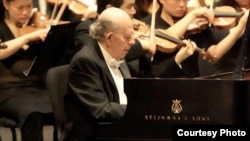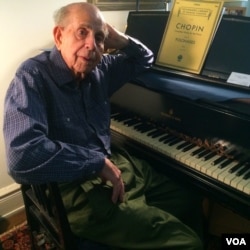The peaceful atmosphere in the Upper West Side apartment where 92-year-old Walter Hautzig plays his piano amid family photographs and framed honors is many worlds away from the pre-war Vienna where he grew up. In 1938, when Hautzig was a 16-year-old prodigy, the Nazis took power in Austria.
Hautzig says Jews were routinely beaten in the streets. Their businesses were closed.
“That was the Austria I grew up in. You can’t imagine,” he said with a grimace.
Music was the boy’s only refuge. After authorities closed the state music academy he attended, Hautzig made a forbidden visit there, only to find the place filled with German soldiers. Their rifles covered the pianos.
And then a miracle happened.
Hautzig learned that the director of the Jerusalem Conservatory of Music was coming to Vienna to hold auditions for new students. Not knowing where they were to be held, Hautzig arrived at the man’s hotel at eight in the morning and waited. The director arrived at two in the afternoon, only to offer his regrets and leave to hail a taxi.
Desperate, Hautzig made his move.
“I jumped into the taxi ahead of him,” he recalled, “and said ‘I’m going with you!’ That took a lot of chutzpah. We got to an apartment and there was a piano. The director pointed to it and said ‘Play! Spiel!’ And I sat down and I played. When I finished, he said ‘I’ll bring you to Jerusalem under any circumstances.’”
From Nazi-Occupied Vienna to Palestine, then New York
With further chutzpah and some luck, Hautzig obtained an ultra-rare exit visa and left for Palestine, leaving his family behind. His parents later managed to get out of Austria too. His mother joined his sister in New York the very day Hitler invaded Poland. Another sister escaped on skis into Switzerland.
Hautzig flourished at the music conservatory in Palestine, but after a year-and-a-half, went to join his family in New York.
“New York at that time was full of refugees like me. They were at the opera and they were in the orchestras, and they became the conductors of major orchestras," he said. "They brought a lot with them,” including the Romantic musical traditions of the Old World.
Hautzig particularly remembers an elderly habitué of the Jewish cafeterias. Max Graf had been an important critic in Vienna before the Nazis.
Graf regaled the younger man with stories about Johannes Brahms (1833-1897), whom he had known as a youth, and Johann Strauss (1864-1949), the composer of “The Blue Danube” and many celebrated waltzes. He also spoke of the time he accompanied Strauss to a meeting with Hindemith, the avant-garde composer.
“And Strauss said to Paul Hindemith ‘Why do you write atonal music? You don’t have to do that. After all you have talent!’” recalled Hautzig with a laugh.
Hautzig’s own talent was widely admired at his New York debut at Town Hall in 1943. He began to tour America, including the racially-segregated South. What he saw disturbed him.
“When I saw "colored” washrooms and that blacks had to sit at the back of the bus, I said to my hosts, ‘You are the same as Nazis!’ And they resented it and gave me all kinds of reasons. It was horrible! Oh, I got into a lot of trouble.”
A king’s handshake and a lover’s look
In 1947, during his first concert tour in Europe, Hautzig played a concert in Norway to benefit Nazi war victims. After the final concert, the King of Norway invited him and a few other artists in Hautzig's entourage to come see him at the palace. Hautzig was honored, and wanted to get the protocol right.
“So I called the embassy to ask ‘How do I talk to a king?’ ‘Well’ they said, ‘you must remember two things: you never shake hands and you never sit down.’ I come in [to the King’s presence]. There stands King Haakon with his outstretched hand, saying ‘How do you do?’ and pushes me into a chair," he said. "And I laughed. And I told him [what I’d been told], and he laughed too.”
Hautzig met Esther, his future wife of 59 years, on the sea voyage home. She was 16 years old, and seasick. For him, it was love at first sight. Her moment came later, during their courtship in New York.
“I played for her the G Minor Ballade of Chopin and she said, ‘Anybody who plays like that has to be good,’” recalled Hautzig, on the verge of tears.
Hautzig quickly became an international star, touring in distinctly non-Westernized locales as diverse as Kabul, Dhaka, Indonesia, Colombia and Suriname, often under the sponsorship of the U.S. State Department. He had unshakeable faith in the music’s universal appeal, saying “Beethoven and Chopin are as good for the Asians as for the Europeans as for the Jews as for the Gentiles.”
Eleanor Roosevelt reassures the maestro’s wife
On one tour of Japan, Hautzig performed 30 concerts in 27 days. That feat caught the attention of former First Lady and humanitarian Eleanor Roosevelt. She invited him to perform at a home for delinquent boys she supported and then to come with his wife to her home for the weekend.
Hautzig was utterly charmed by Mrs. Roosevelt’s warmth and lack of affectation.
“And when we said goodbye, I said Mrs. R. - everybody called her Mrs. R. - I have fallen in love with you! And I’m telling you this in front of my wife.’ And in her high voice, she took Esther by the hand and said ‘My dear, let me tell you that this time, you really have nothing to worry about!’” Mrs. Roosevelt was then in her seventies, and Mrs. Hautzig was in her 30s.
In 1979, when U.S. President Jimmy Carter wanted to warm relations with China, he honored Hautzig by inviting him to tour the country as the first U.S. cultural ambassador there. Twenty or so years later, Hautzig gave a special concert for Mr. Carter and his wife Rosalynn.
“At the end of it, when I said goodbye I said ‘Mr. President, we are both young. I want to pray for you for the next 20 years, and then we’ll ask for more!’ He patted me on the back and said ‘God bless you.’"
Hautzig taught piano at the Peabody Conservatory of Music in Baltimore for 27 years. He is cautious in his assessment of the rising generation of professional musicians.
“They play very loud and very fast and sometimes not very expressively. They are perfectly efficient and so on, but there is something missing [below the surface] with some of them.”
But after a thoughtful pause and a sigh, he adds, with a half-smile “We’ll see what happens. They are good. But we were not bad either!”
"Practice Makes Perfect"
Walter Hautzig practices and prepares for a benefit concert at Lincoln Center:







